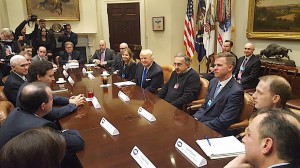
Mexican President Enrique Pena Nieto is making good on promises that Mexico will retaliate with new tariffs on American goods.
The trade group representing General Motors, Ford Motor Co. and Fiat Chrysler Automobiles N.V. is warning that new tariffs on steel and aluminum made in Mexico, Canada and the European Union will damage the U.S. auto industry.
Governor Matt Blunt, president of the American Automotive Policy Council, warned that the Trump administration’s decision of levy the tariffs has serious consequences for car makers in the United States.
“The imposition of tariffs on our trading partners in the EU, Canada and Mexico will undermine the global competitiveness of the U.S. auto industry and invites retaliation from our trading partners.
“While we fully understand the desire to take action against nations whose unfair trade practices have led to global overcapacities in steel and aluminum, we would urge the administration to continue to negotiate with close trading partners and allies such as the EU, Canada and Mexico.”
(Trump slaps tariffs on Canada, Mexico and the EU. Click Here for details.)
In its formal comments submitted to the Commerce Department on the 232 steel and aluminum investigations, AAPC highlighted the fact that its automakers source the vast majority of the steel and aluminum used in U.S.-built cars and trucks from American mills and smelters. AAPC also noted that the U.S. automotive industry purchases about 15% of the steel consumed in the U.S. and nearly 38% of all aluminum used in our country.
The Association of Equipment Manufacturers said “starting a trade war with three of our nation’s largest trading partners and strongest allies will disrupt the entire global trading system, placing American manufacturing jobs at risk.”
American Automotive Policy Council has stepped up its lobbying efforts in the face of the Trump administration to impose new protectionist trade practices. But so far, it has little to show for its efforts.
In addition to the tariffs, AAPC is on the verge of losing its battle to protect the North American Free Trade Agreement, which has long been one of Trump’s favorite targets. The new tariffs on Mexican and Canadian steel and aluminum will make it harder to reach agreement on revisions to NAFTA, observers have said.
(Click Here for the story about May U.S. new vehicle sales.)
Trump has downplayed the danger of a trade war, calling such conflicts “easy to win.” That theory will now be put to the test as key trading partners now moving to inflict maximum pain on parts of the American economy, according to The Hill, a newsletter that follows Washington developments.
In Canada, U.S. steel components will be taxed at 25%, while other goods, including aluminum, toilet paper, whisky and orange juice, will see tariffs of 10%. The tariffs will remain in place until the United States drops its duties. “This is the strongest trade action Canada has taken in the post-war era,” Freeland said.
Mexico said it would impose tariffs on a wide range of American products, including steels such as hot and cold foil, lamps, pork, sausages, apples, grapes, blueberries and various cheeses.
“Mexico deeply regrets and condemns the decision of the United States to impose these tariffs on imports of steel and aluminum from Mexico from June 1, at the discretion of national security,” the government said in a statement. “Mexico has indicated repeatedly that such measures under the criteria of national security are not adequate nor justified.”
Last year, nearly half of U.S. steel and aluminum imports came from the EU, Canada and Mexico.
(Hamburg, Germany becomes first city to ban older diesels. Click Here for the story.)
But Wilbur Ross, the U.S. Secretary of Commerce, in an interview on cable news dismissed suggestions that the U.S. is igniting a trade war with allies and downplayed the effects on the U.S. economy as “trivial.”

